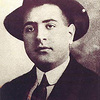João de Melo
Autor de Gente feliz com lágrimas
Sobre El Autor
Créditos de la imagen: Por Jorgepchc - Obra do próprio, CC BY-SA 4.0, https://commons.wikimedia.org/w/index.php?curid=63735958
Obras de João de Melo
Os anos da guerra (1961-1975) - Os portugueses em África - Crónica, ficção e historia (1988) 7 copias
Histórias da resistência 1 copia
O Cão dos Olhos Dourados 1 copia
" Toda e Qualquer Escrita" 1 copia
Gente Feliz com Lãgrimas 1 copia
Os Anos da Guerra 1 copia
Açores, o Segredo das Ilhas 1 copia
Os Anos da Guerra - 1961-1975 - Os Portugueses em África - Crónica, Ficção e História - Vol I 1 copia
Obras relacionadas
Etiquetado
Conocimiento común
- Fecha de nacimiento
- 1949
- Género
- male
- Nacionalidad
- Portugal
- Lugar de nacimiento
- Azores, Portugal
- Lugares de residencia
- Madrid, Spain
Miembros
Reseñas
Premios
También Puede Gustarte
Autores relacionados
Estadísticas
- Obras
- 31
- También por
- 1
- Miembros
- 183
- Popularidad
- #118,259
- Valoración
- 4.0
- Reseñas
- 3
- ISBNs
- 41
- Idiomas
- 5













